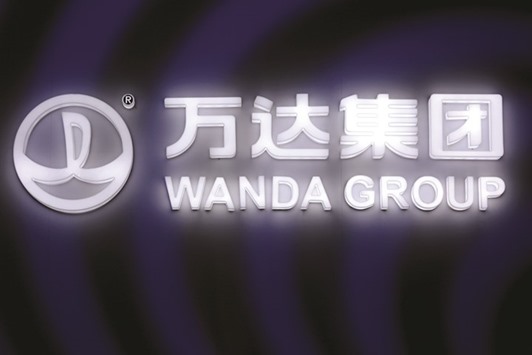Chinese billionaire Wang Jianlin’s Dalian Wanda Group is offering HK$34.5bn ($4.4bn) to buy out its Hong Kong-listed property unit in the biggest take-private deal on the exchange ever, as it seeks a higher valuation for the business on mainland stock exchanges.
Wanda Group will pay HK$52.80 for each Hong Kong-traded share of Dalian Wanda Commercial Properties Co, the company said in a statement yesterday, 10% higher than an earlier offer of at least HK$48 and 3% higher than its last traded price of HK$51.25 before it was halted on April 22. The shares, which have been listed in Hong Kong for less than two years, fell to HK$49.25 after resuming trading yesterday.
Wang, who controls Wanda Commercial’s Beijing-based parent, told China Central Television on May 22 that the unit is “substantially undervalued” and must proceed with the privatisation. The billionaire has been seeking investors to help purchase as much as 14.41% of the shopping-mall operator and re-list it in mainland China, according to a document sent to prospective backers.
Going-private deals that aim to relocate overseas share listings to Shanghai or Shenzhen have been under the spotlight after China’s stock regulator voiced concerns such transactions could flood its market. Wanda’s transaction is pending shareholder and regulatory approvals, according to the statement.
The offer “might be a bit lower than investors’ expectation,” Jeffrey Gao, a Hong Kong-based analyst at Nomura Holdings, said by e-mail. “Investors need to worry about the risk” of the deal not going through and the “time cost” involved.
Wanda’s proposed transaction would be the biggest going-private deal on the Hong Kong stock exchange, beating Alibaba Group Holding’s proposal in 2012 to take its Hong Kong-traded unit private for as much as HK$19.6bn, according to data compiled by Bloomberg.
In its pitch to investors, Wanda Group cited an average valuation of 29 times estimated full-year earnings for mainland listings, based on four companies engaged in managing free-trade zones and industrial parks. Wanda Commercial was trading at about 6.4 times before trading was halted in April, according to data compiled by Bloomberg.
Wanda Group will proceed with plans to buy out the property unit after considering whether to scrap the deal in the wake of Chinese regulatory concerns, people familiar with the matter had said. The company decided to continue with the delisting after “taking into account the possible adverse commercial impact” if agreements with investors backing the plan, already executed in April, were to be terminated, according to the statement.
A unit of Ping An Insurance (Group) Co, China’s second-largest insurer, has committed to buying 21.9% of the H shares, according to the statement.
Wanda Commercial’s shares, which debuted on the Hong Kong exchange at HK$48, rose to a peak of HK$77.20 in June 2015. They’ve traded at an average price of HK$49.52.
The offer “provides an attractive opportunity for independent H shareholders to dispose of their H shares” and put their money in investments with higher liquidity, the company said in the statement, citing the premium proposed and the difficulty in otherwise selling their holdings in the market without hurting the share price. “It is highly unlikely that another third party will be willing to pay a considerable premium” for the shares, according to the statement.
Wang joins a growing number of Chinese tycoons seeking loftier valuations for their companies by moving their listings from Hong Kong or New York. Evergrande Real Estate Group may consider going private and list in China given its chairman’s view that the developer’s valuation in Hong Kong is distorted, Citigroup Inc said in an April 18 report. US-listed SouFun Holdings, China’s biggest real estate web portal, is seeking to move its shares to the Shanghai stock exchange via a backdoor listing.
Such deals have drawn regulator scrutiny, with the China Securities Regulator Commission saying in early May it’s conducting research on their possible impact. Regulatory concerns have recently roiled shares of US-traded Chinese companies such as Qihoo 360 Technology that have announced privatisation plans.
If Wanda Commercial has not gone public on a mainland exchange by either August 31, 2018, or two years from the Hong Kong de-listing, Wanda Group will buy back the shares at a level guaranteeing a 12% annual return for domestic investors and 10% for those overseas, according to the document sent to prospective backers, a copy of which was obtained by Bloomberg News. The 14.41% figure Wang is seeking investors for represents the portion of the company not controlled by him and other mainland shareholders.
The proposal promises a “relatively large room for arbitrage” for investors given that the property arm’s Hong Kong-listed shares are “seriously undervalued,” the company said in the document. Wanda Group said March 30 it was considering offering HK$48 or more for the developer’s Hong Kong shares, causing the stock to surge as much as 22% the following day.

A signboard of Dalian Wanda Group in Beijing. The firm will pay HK$52.80 for each Hong Kong-traded share of Dalian Wanda Commercial Properties, the company said in a statement yesterday.
